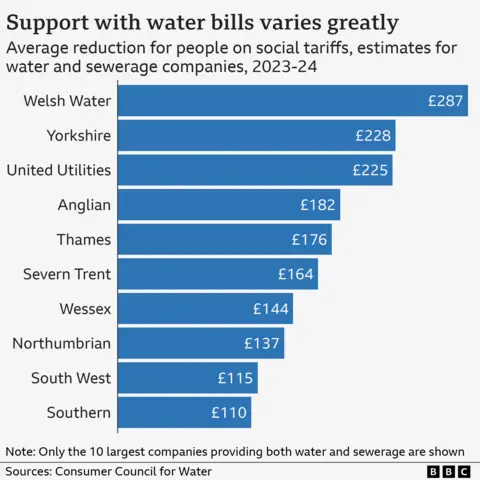ARTICLE AD BOX

 BBC
BBC
Morgan Davies and Ellie Bryan got their water bills cut after a no-fault eviction left them struggling
The number of households seeking help with water bills in England and Wales rose by more than 250,000 last year, according to figures seen by the BBC, but support varies widely depending on where people live.
Water companies spent almost £259m on "social tariffs" last year - discounted bills to help low-income households - but they each have different criteria and offer different levels of discount.
Those on Welsh Water social tariffs got an average bill reduction of £287, while Southern Water customers got an average of £110 off in 2023-24.
The Consumer Council for Water (CCW) is calling on firms to have a single scheme so that everyone gets the same level of help wherever they live.
The number of households on social tariffs has risen by a fifth since last year to a record 1.6 million. Spending on them rose by a quarter, according to CCW data.
It said the increase was down to companies doing more to promote their support schemes, data sharing between the government and councils helping to identify customers in need, and the cost of living leading to more households seeking help.
But there are concerns that support is not the same across the country and that people could be missing out on help simply because of where they live.
Each company’s social tariff scheme differs based on things like household income, benefits received, individual water bills and how much people have in savings.
‘Help is out there if you look’

 Ellie Bryan and Morgan Davies
Ellie Bryan and Morgan Davies
Morgan and Ellie say a social tariff has helped them manage debt to afford things for their children
When Morgan Davies and Ellie Bryan from Liverpool found themselves facing a no-fault eviction, the costs of moving saw them fall behind on their bills.
“We’re still paying off some of the bills from the old house. Our water bill was between £300 and £400 in debt from the other house, combined with this house, we just got behind on all the payments," says Ellie, 31.
Morgan, 25, adds: “We were over £4,000 in debt. We had to do so many payment plans and it was getting to the point where we had to get a payment plan for another payment plan.”
The couple, who both work as supermarket shift leaders, got advice from Money Wellness and a letter from water company United Utilities pointed them towards a social tariff.
Their bill went from about £39 a month to about £25.
“I’d say don’t be embarrassed about admitting you’re behind on some payments. You just need to ask for help," says Ellie.
"If you’re struggling with debts, call the company because nine out of 10 times they have a solution for you. There is help out there if you look.”
But who gets that help and to what extent varies depending on which water company people are with. And unlike with electricity and gas, people cannot simply switch to a competitor.
Data from the CCW suggests that among the 10 biggest water and sewerage firms, the average bill reduction in 2023-24 ranged from £287 for people supplied by Welsh Water (Dŵr Cymru) down to £110 for customers of Southern Water.
The CCW’s data is not calculated as a percentage of individual bills, which differ significantly owing to regional variations and usage levels for those on a meter.
It also does not separate out support for customers who get water and sewerage from different companies.
Across England and Wales, the average bill was about £445 in 2023-24, rising to £473 for 2024-25.


Southern Water told the BBC it has some of the lowest bills in the country and said it knows there are households struggling with the cost of living.
“This is why we’ve kept our minimum discount for those in need at 45%, rising to 90% if necessary.
"We’re planning to more than quadruple the value of our Hardship Fund to £1.25m per year and we’re extending our Priority Services Register from 12% to 20% of our customers," the company said.
'Postcode lottery'
Andy White, senior leader for the CCW, said it was good that more people than ever were getting help through social tariffs.
“However, it also shines a light on the fact that there are significant differences in the support that is available to customers depending who serves them as a water company,” he said, describing it as a “postcode lottery”.
“Whether you actually get the help and qualify for that, and how much help that is, depends entirely on the scheme that each company is offering,” he said.
“And we don’t think it’s right that people should have different support depending on where they live.”
The CCW wants companies to have one social tariff for people who cannot afford their water and to all contribute to a shared pot so that the costs do not fall heaviest on the poorest areas.
Water UK, which represents water companies, said: “Ultimately it is up to Government to set the guidance on social tariffs, but water companies offer significantly higher reductions than other utilities such as energy."
The government said it was committed to supporting vulnerable consumers with their bills and addressing water poverty, and had announced “an Independent Water Commission which will report back next year with recommendations to protect customers".
How do water companies decide who to help?
Every company applies its own criteria for deciding whether someone can have a social tariff.
Thames Water’s website says its WaterHelp is for people whose bills are more than 5% of net income and offers a 50% discount to those who qualify, while Yorkshire Water says people might be eligible for its WaterSupport if they have a household income below £19,000 and an annual water bill of more than £364.
Companies may also ask about savings. Southern Water says people must have less than £16,000 as well as a household income of less than £22,020, or that everyone must be receiving pension credits, to be eligible for its Essentials tariff.
Welsh Water, which is not for profit, offers support if someone in the household receives at least one means-tested benefit and has different income thresholds depending on how many people live there.
Social tariffs are not the only form of support on offer. The CCW data also showed an additional £66m went to more than 200,000 accounts on a separate scheme called Watersure, which caps bills for people on meters who claim certain benefits and have a high water use.

 6 months ago
32
6 months ago
32








 English (US) ·
English (US) ·